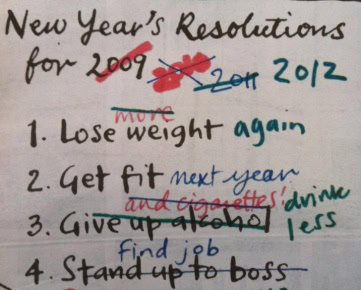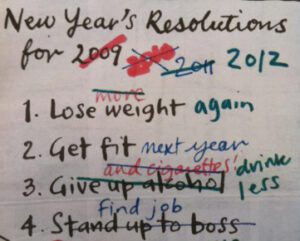The Ins and Outs of New Years Resolutions: Strategies for Achieving your Goal


So how can we avoid the trap of making a resolution/goal that falls to the wayside by early February? Some simple ways to set yourself up for success are:
- Start with small goals and build self-trust that you are able to keep them
- Talk to a friend about your goals/ write down your goals
- Use technology. Fit bit and other phone apps can be enormously helpful in providing continual motivation
- Use mental imagery to see yourself in action
- Explore the resistance you feel with a friend or professional
- Set SMART (specific, measurable, attainable, relevant and time-bound) goals
These simple tactics when setting a goal/ resolution will set you up to be more successful. The satisfaction of meeting simple attainable goals will propel you to keep at it and foster motivation.
A different way to look at New Year’s resolutions is take the resolution part right out of it and instead set a New Year’s Intention. By re-branding what you want to achieve as an intention you can take the pressure of yourself and make it more about the process. Setting a simple intention for the year, month or even day can help you frame what you hope to achieve and then reflect on the process of getting that done. Like goals intentions should be specific and attainable.
Even very simple daily changes that can be readily incorporated into daily life can have huge benefits. These could make a great place to start when thinking about setting a New Year’s Resolution/ Intention. A few examples are:
- Get more sleep – according to the national Sleep Foundation most Americans are living with a sleep deficit. Adults function best on 7-9 hours of sleep.
- Drink more water- experts suggest a minimum of 64 oz. per day if stationary and more if exercising.
- Eat a healthy breakfast- many studies show the importance of eating breakfast as a catalyst for clearer memory, attention in addition to reduced levels of obesity.
- Exercise for a few minutes each day- The Centers for Disease Control and Prevention suggests that adults perform at least 150 minutes of moderate aerobic activity or 75 minutes of intense activity every week.
- Practice gratitude- gratitude has been shown to have many healthy benefits including: better sleep, better relationships, increased physical health, stress reduction, increased levels of social interactions. (Not sure how to start doing this? Here’s a list of 40 simple ways to start!
Making a meaningful change is rarely if ever easy. However, by taking a few steps to set yourself up for success you be achieving your goal and fulfilling your intentions before you know it!
Read more about Intent Clinical’s Therapeutic Recovery Coaching Services.

